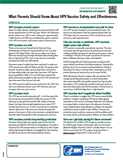HPV Vaccine Safety
The human papillomavirus (HPV) vaccines are safe, effective, and offer long-lasting protection against cancers caused by HPV.

Each HPV vaccine—Gardasil® 9, Gardasil®, and Cervarix®—went through years of extensive safety testing before they were licensed by the U.S. Food and Drug Administration (FDA). Gardasil® 9 was studied in clinical trials with more than 15,000 females and males; Gardasil® was studied in clinical trials with more than 29,000 females and males, and Cervarix® was studied in trials with more than 30,000 females.
Research from before and after the vaccines were licensed show that HPV vaccines are safe. As with all approved vaccines, CDC and the FDA closely monitor the safety of HPV vaccines after they are licensed. Any problems detected with these vaccines will be reported to health officials, health care providers, and the public.
Like any vaccine or medicine, HPV vaccines can cause side effects. The most common side effects are pain, redness, or swelling in the arm where the shot was given; dizziness, fainting, nausea, and headache. HPV vaccination is typically not associated with any serious side effects. The benefits of HPV vaccination far outweigh any potential risk of side effects.
Read more: Summaries, reports, and frequently asked questions about HPV Vaccine Safety.
Related Pages
- Fact Sheet: What Parents Should Know About HPV Vaccine Safety and Effectiveness
- HPV Vaccine Safety - Questions and Answers
- CDC Medscape Commentary: Safety Data on the HPV Vaccine—Reassure Your Patients, Reports to VAERS Following HPV Vaccination
- MMWR - Human Papillomavirus Vaccination Coverage Among Adolescents, 2007–2013, and Postlicensure Vaccine Safety Monitoring, 2006–2014 — United States
- HPV Vaccine Information Statements
- Page last reviewed: September 30, 2015
- Page last updated: September 30, 2015
- Content source:


 ShareCompartir
ShareCompartir
